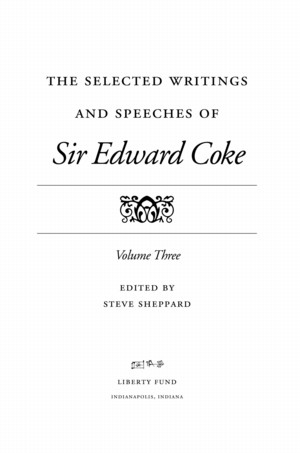
Part of: Selected Writings of Sir Edward Coke, 3 vols. Selected Writings of Sir Edward Coke, vol. III
- Steve Shepherd (editor)
- Sir Edward Coke (author)
Vol. 3 of a 3 vol. set of The Selected Writings. This volume contains Coke’s speech in Parliament (including the Petition of Right), a number of official acts related to Coke’s career, and other matters.
Key Quotes
Law
And where also by the statute called the Great Charter of the Liberties of England, it is declared and enacted that no free man may be taken or imprisoned, or be disseized of his freehold or liberties, or his free customs, or be outlawed or exiled, or in any manner destroyed, but by the lawful…